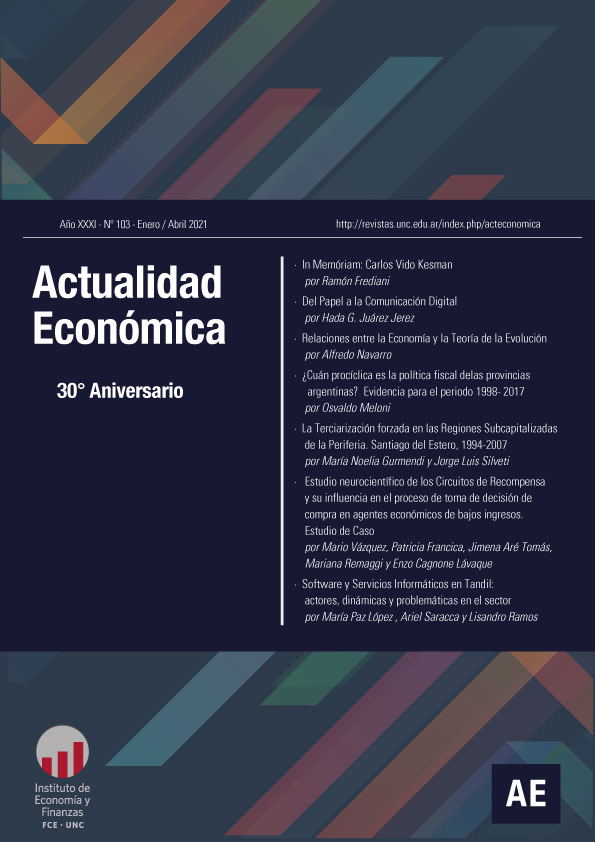How pro-cyclical is the fiscal policy of Argentine provinces? Evidence for the period 1998- 2017
Keywords:
fiscal policy, pro-cyclicality, ArgentinaAbstract
This paper provides evidence on the fiscal policy prociclicality of Argentina's subnational districts. I estimate an error correction model using a panel spanning 20 years (1998 – 2017) and all 24 districts. I find that fiscal policy of subnational jurisdictions is procyclical in all main categories of public expenditure and tax revenue except for automatic transfers, which have no statistical significance. The response of spending to the contemporary growth of the economic activity is greater than that estimated by Meloni (2018) for the period 1985-2007, similar to the ones obtained by Abbott et al. (2015) for Mexican states and lower than Arena and Revilla (2009) for Brazilian states. My estimates confirm that total resources are also procyclical with discretionary transfers being the most procyclically.
Downloads
References
Abbott, A. and Jones, P. (2012). “Intergovernmental transfers and procyclical public spending.” Economics Letters 115: 447-451.
Abbott, A., Cabral, R., Jones, P. and Palacio, R. (2015). “Political pressure and procyclical expenditure: An analysis of the expenditures of state governments in Mexico.” European Journal of Political Economy 37: 195–206
Alesina, A., Campante, F. and Tabellini, G. (2008). “Why is fiscal policy often procyclical?” Journal of the European Economic Association, September 6(5):1006–1036
Akitoby, B., Clements, B., Gupta, S. and Inchauste, G. (2006). “Public spending, voracity, and Wagner’s law in developing countries.” European Journal of Political Economy, 22: 908-924.
Arena, M. and Revilla, J. (2009). “Pro-cyclical Fiscal Policy in Brazil. Evidence from the States.” Policy Research Working Paper 5144. The World Bank.
Barro, R. (1979). “On the Determination of the Public Debt.” Journal of Political Economy 87 (5); 940-71. Part 1, October.
Blundell, R. and Bond, S. (1998) “Initial conditions and moment restrictions in dynamic panel data models”. Journal of Econometrics 87 (1): 115-143.
Brückner, M. and Gradstein, M. (2014). “Government spending cyclicality: Evidence from transitory and persistent shocks in developing countries.” Journal of Development Economics, 111 107–116
Catão, L. and Sutton, B. (2002). “Sovereign Defaults: The Role of Volatility.” IMF Working Papers 02/149, International Monetary Fund.
Cukierman, A., Edwards, S. and Tabellini, G. (1992). “Seigniorage and Political Instability.” American Economic Review 82: 537-55.
Frankel, J. and Schreger, J. (2013) “Over-optimistic official forecasts and fiscal rules in the eurozone,” Review of World Economics, 2013, 149 (2), 247–272.
Frankel, J. and Schreger, J. (2016) “Bias in official fiscal forecasts: can private forecasts help?” NBER, Working Paper 22349.
Gavin, M. and Perotti, R. (1997). “Fiscal policy in Latin America.” NBER Macroeconomics Annual, 12: 11–61.
Jones, M., Meloni, O. and Tommasi, M. (2012). “Voters as Fiscal Liberals: Incentives and accountability in federal systems.” Economics and Politics. Vol. 24(2): 135-156.
Lane, P. and Tornell, A. (1996). “Power, growth and the voracity effect.” Journal of Economic Growth. 1(2):213–241.
Kaminski, G., Reinhart, C. and Vegh, C. (2004). “When it rains, it pours.” In: Gertler, Mark, Rogoff, Kenneth (Eds.), NBER Macroeconomics Annual. MIT Press, Cambridge, United States.
Meloni, O. (2016). “Electoral opportunism and vertical fiscal imbalance.” Journal of Applied Economics. 19(1).
Meloni, O. (2018) “Turning a Blind Eye to Policy Prescriptions: Exploring the Sources of Procyclical Fiscal Behavior at the Subnational Level” Public Finance and Management, 18(3-4): 265-284.
Rodden, J. and Wibbels, E. (2010) “Fiscal decentralization and the business cycle: an empirical sty of seven federations”. Economics and Politics, 22(1):37-67.
Sturzenegger, F. and Werneck, R. (2006). “Fiscal Federalism and Procyclical Spending: The Cases of Argentina and Brazil.” Económica, La Plata, Vol. LII, Nro. 1-2, 2006.
Talvi, E. and Végh, C. (2005). “Tax base variability and procyclical fiscal policy in developing countries.” Journal of Development Economics 78, 156–190.
Tornell, A. and Lane, P. (1999). “Voracity and Growth.” American Economic Review, 89, 22–46.
Downloads
Published
Issue
Section
License

This work is licensed under a Creative Commons Attribution-NonCommercial-NoDerivatives 4.0 International License.
Those authors who have published with this journal, accept the following terms:
Authors will conserve their copyright and guarantee the magazine the right of first publication of their work, which will be simultaneously subject to the Creative Commons Attribution-NonCommercial-NoDerivative 4.0 International License that allows third parties to share the work as long as the author and first publication of this magazine are indicated.
Authors may adopt other non-exclusive license agreements to distribute the published version of the work (e.g., deposit it in an institutional telematic archive or publish it in a monographic volume) provided that the initial publication in this journal is indicated.
Authors are allowed and encouraged to disseminate their work through the Internet (e.g., in institutional telematic archives or on their website) before and during the submission process, which may lead to interesting exchanges and increase citations of the published work. (See The effect of open access)









